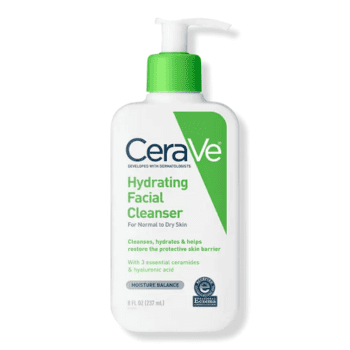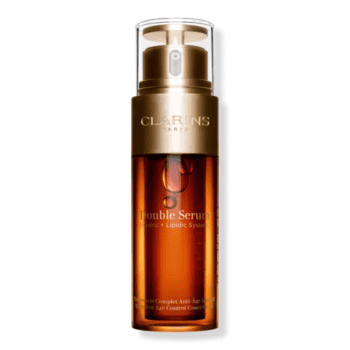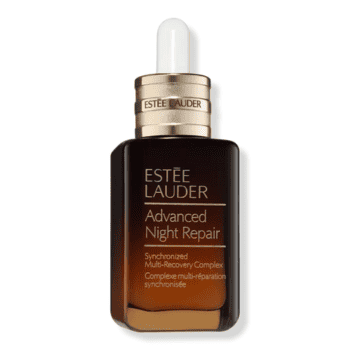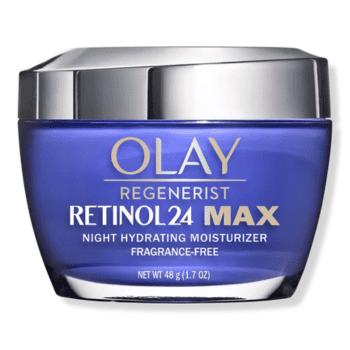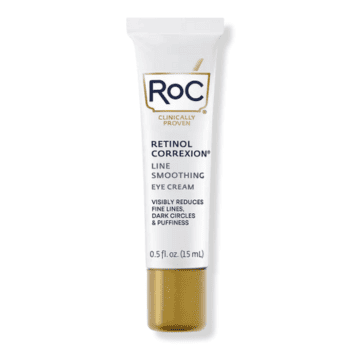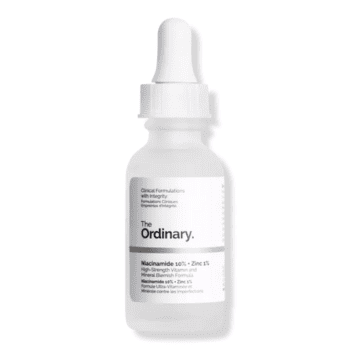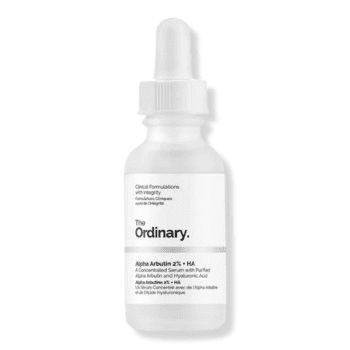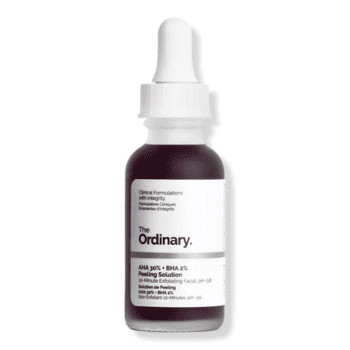The Foolproof Skincare Routine for Beginners: From Novice to Pro!
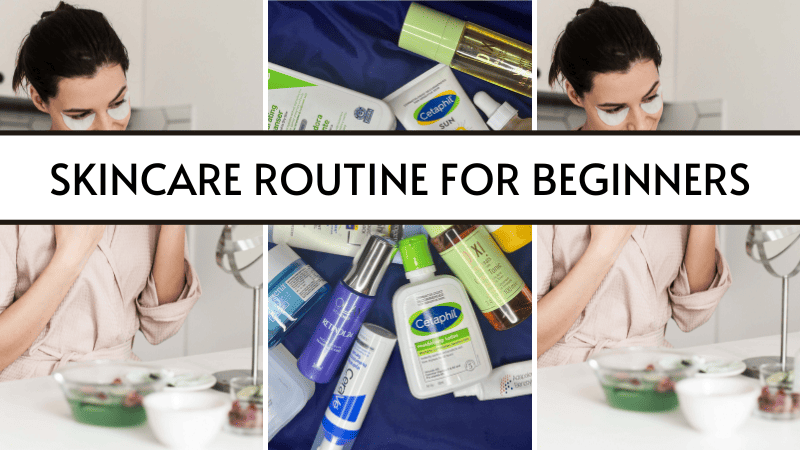
I only recommend products I love and I think you will, too. If you click on links I provide, I may receive a little compensation. Learn more.
Ready to dip your toes into the world of skincare? Let’s give you a simple and effective skincare routine for beginners!
Skincare has become an overwhelming concept for many of us today. There’s so much going on that it’s tricky to keep up.
You decide to do some good to your skin, and you’re bombarded with countless products, beauty creams, and serums — something that should not even be your first priority.
Finding the right skincare routine is a lot more than just adding the most-hyped products to your cart and following in the influencers’ footsteps.
Every skin is different — it’s a result of numerous external (lifestyle, pollution) and internal (genetic) factors. You might have a medical condition that’s overlooked by the influencer and copying them will only do you more harm.
Thus, skincare is more about understanding your skin first and then finding suitable products to keep it healthy.
On that note, I’m gonna be talking about the skincare routine for beginners in this blog. Whether you wish to stick to a basic routine or expand it later on, here’s a definite guide on skincare inclusive of every important fact you must know.
Let’s understand Skincare!
Let’s grasp this concept more simply.
What do you think when you hear the word “skincare”? A flawless, glossy, glass skin? Or healthy and hydrated skin?
I know they are the same in terms of appearance. But what matters most is how you perceive the word “skincare.”
The aim of your skincare routine should be to protect your skin, not make it more vulnerable for the sake of “flawlessness.” In short, you have to look at the cosmetic as well as the medical benefits of adopting a skincare routine.
Maybe there’s a specific skin condition you want to treat. Or you’re trying to fall in love with yourself again through self-care. Or, it’s neither, and you simply want to look good and keep your skin healthy.
My point is, before anything, find out why you need a skincare routine. That will push you in the right direction and benefit your skin to the max.
First, Determine Your Skin Type
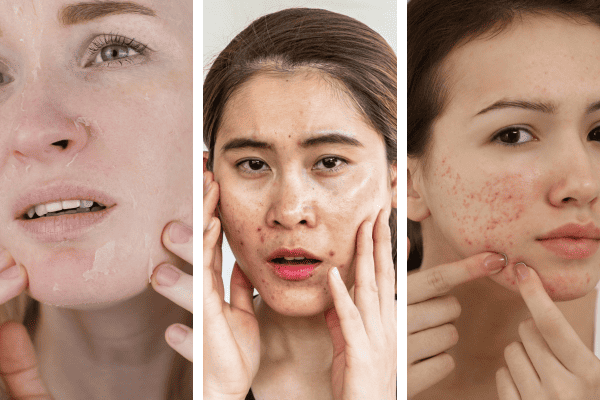
Once you’ve found out your meaning of skincare, it’s time to see what skin type you have.
Not all skin types can use the same product. Your choice of ingredients plays a huge role in deciding the efficacy of the skincare routine.
Below I’ve explained the basic skin types and how to check yours.
1. Dry Skin
People with dry skin type complain of rough and flaky skin texture. There’s almost no elasticity in the skin — unaddressed dry skin feels tight and as if it’s tearing apart.
2. Oily Skin
While someone might admire the glow your face has, deep down only you can understand how sticky your skin has become. Even without a moisturizer, your skin gets greasy in a couple of minutes after washing. That’s when you know you have oily skin.
3. Combination Skin
As the name suggests, this skin type is a combination of oily and dry skin types. Thus, you might have an oily T-zone but coarse and dry cheeks.
4. Sensitive Skin
Besides having a dry, oily, or combination skin type, there are chances your skin might be sensitive if it readily reacts and is prone to irritation.
What is the best way to find out Your Skin Type?
Wash your face with a mild face wash, and do not apply anything for 15-20 minutes. Take a blotting paper and pat it on your cheeks, forehead, nose, and chin.
If there’s no oil absorbed by the blotting paper, you have a dry skin type. On the other hand, if the paper picks up oil from all four parts, you likely have oily skin.
If you have a combination skin type, the paper will become oily only after applying it to the T-zone (foreheads, nose, and chin).
The Basic Skincare Routine for Beginners
Now that you have found out your skin type let’s proceed to the soul of this article — skincare routine for beginners.
There are numerous steps involved in a skincare regime. But not everything is necessary at stage 1. Therefore, I’ve divided the entire routine into parts – basic and advanced (discussed in the next section).
It’s best to take your time when you’re starting skincare, see what works well for you and then get to the advanced stages.
1. Cleanse
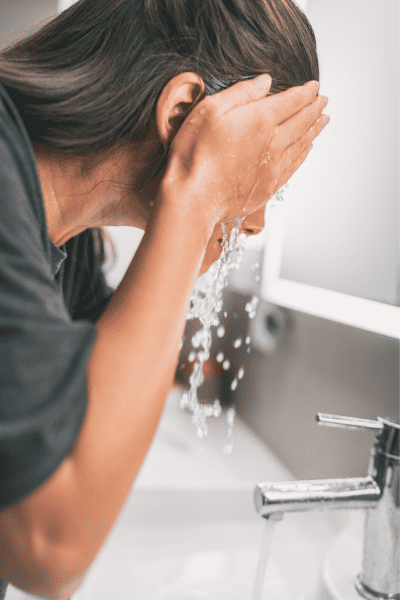
Take any skincare routine and the first step is always to wash your skin. Cleansing helps remove the dirty, greasy buildup on your skin, thus unclogging the pores and preventing infections/acne.
While it’s ideal to cleanse twice a day with a gentle cleanser, it’s alright if you simply splash some water on your face for dry skin types. Cleansing and exfoliating too hard can worsen dry skin. However, do not skip the evening cleansing ritual, no matter your skin type.
If you have oily skin? Look for foaming cleansers. Acne-prone skin type? Gel-based or exfoliating cleansers are the way to go! Normal to dry skin type can opt for cream or water-based face washes, and as far as sensitive skin go, ingredients matter more than the formulation.
2. Moisturize
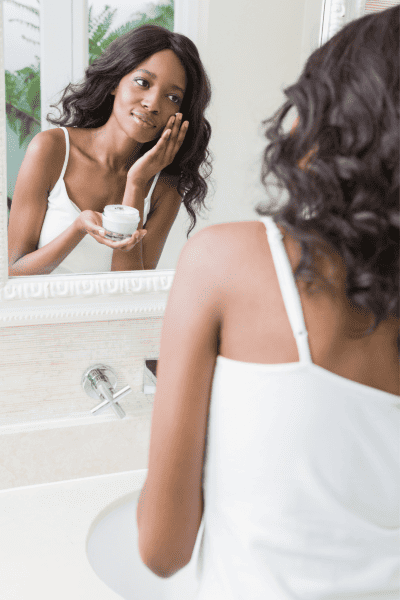
The second step in our basic skincare routine for beginners is to hydrate the skin and lock in moisture.
There are natural hydrators present on the surface of our skin. However, as we age (and so does our skin), they lose their ability to retain moisture, and external help becomes crucial.
Using a moisturizer, thus, becomes inevitable. Plus, it is as vital for oily skin types as for dry ones. Dull, dehydrated oily skin will only become greasy and irritated without a proper moisturizer (if you know the causes of oily skin, you know what I’m talking about!)
Oily skin types should resort to water or gel-based moisturizers, while dry skin would thank you if you slather it with thick cream-based moisturizers. And, of course, non-comedogenic and possibly fragrance-free is the way to go, no matter your skin type!
As for moisturizers, you’ll see two types available – morning and night creams. Please listen to me, night cream is just a tad thicker moisturizer that you don’t need to invest in as a skincare beginner. So forget about it!
3. Protect
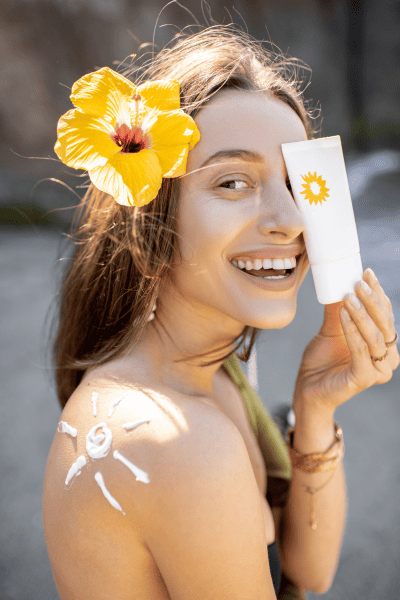
Last, you’ve got to keep the moisturizer in place and safeguard your skin from external pollutants, free radicals and harmful sun rays. Thus, this step includes the use of broad-spectrum sunscreen, typically with a minimum SPF power of 30. No less than that!
If you don’t already know, SPF 30 would ensure that your skin is protected by 97%, so anything above that would only guarantee 1-2% more protection. Cool, right?!
Formulations again depend on the individual skin type. Cream-based for dry skin. Gel-based for Oily and acne-prone skin types. Your sunscreens must be non-comedogenic and should not leave any white residue and broad spectrum. Oh, also, try to find mineral sunscreen with zinc oxide in it!
Apply sunscreen at least half an hour before stepping out in the sun. Do not forget to reapply every two hours if you’re still outside, exposed to the UV rays!
How To Expand Your Skincare Routine, if you want to?
Once the beginner skincare routine has settled in, gradually add more steps in between to expand it. Here’s how:
1. Toners
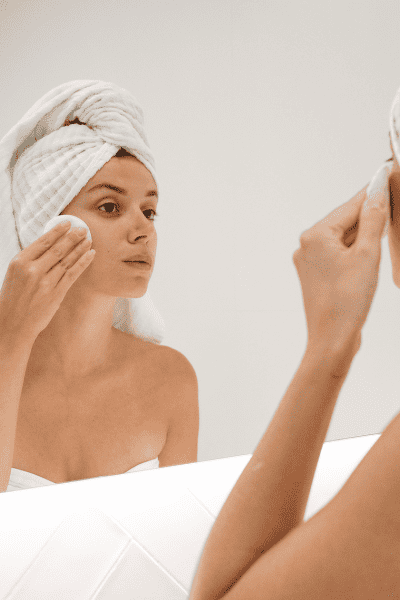
Toners help maintain the pH level of your skin while removing the remaining dirt after the cleansing ritual. They rejuvenate your skin and lock back moisture for a soothing effect.
But that’s not all! Toners are also a must-do if you regularly wear makeup. They prepare your skin to absorb all the coming layers, thus becoming an unskippable step in many skin care regimes.
A hydrating mist or rose water can act as a beautiful toner for normal, dry, and sensitive skin types. And I would recommend an exfoliating one for oily to combination skin.
2. Essences
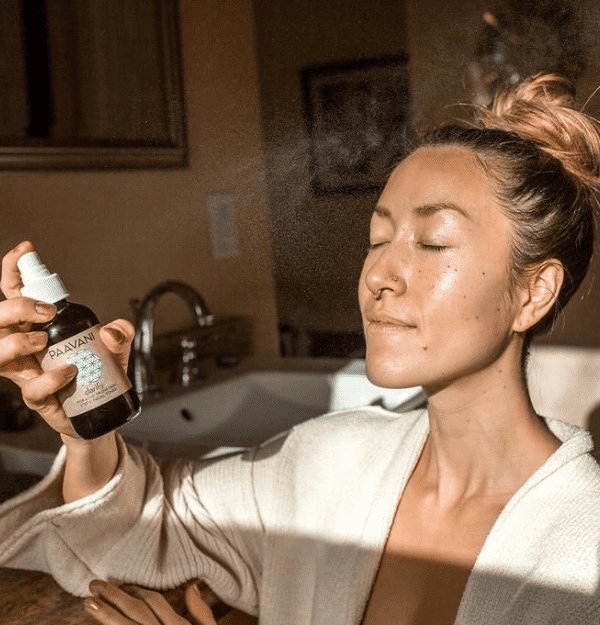
Consider essence as a bridge between your toner and serum. It’s more like a pre-serum product that adds extra hydration to your skin after you’ve applied a toner.
They are basically a power package of active ingredients that boost the overall health of your skin. Yes, they are more diluted than serums and hence cannot stand up to their properties.
Generally, they contain ingredients like glycerin, water, hyaluronic acid, plant extracts, vitamins, minerals, etc. The result is soft, firm skin with a smooth complexion/tone and tight pores.
3. Serums
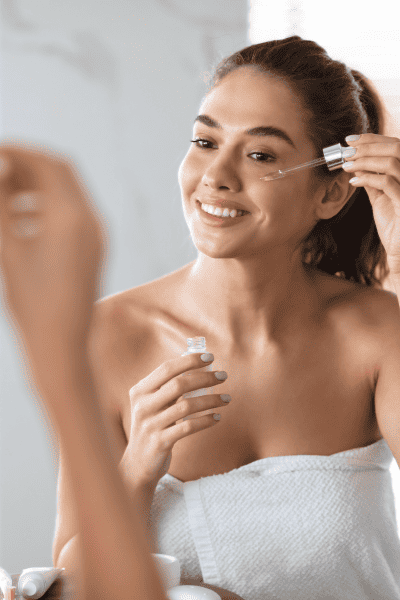
Serums are a BIG YES if you’re suffering from skin problems like fine lines, wrinkles, acne, and dullness.
Owing to their thin viscosity, they are readily absorbed into your skin and leave remarkable results in no time. They calm your skin and protect it from pollutants and UVs while also improving uneven texture.
The best part about them? They’re absolutely light to wear and do not feel greasy!
You can choose whatever serum you like depending on the skin concern you wanna deal with.
- Retinol for fine lines, wrinkles & mature skin
- Vitamin C and Niacinamide for overall glow and health of the skin
- Alpha arbutin for hyperpigmentation
- AHAs and BHAs for oily, acne-prone skin
- Azelaic acid for acne scars & dark spots
- Hyaluronic acid for dry skin
You name the concern, we’ve a product ready for you!
4. Sheet Masks
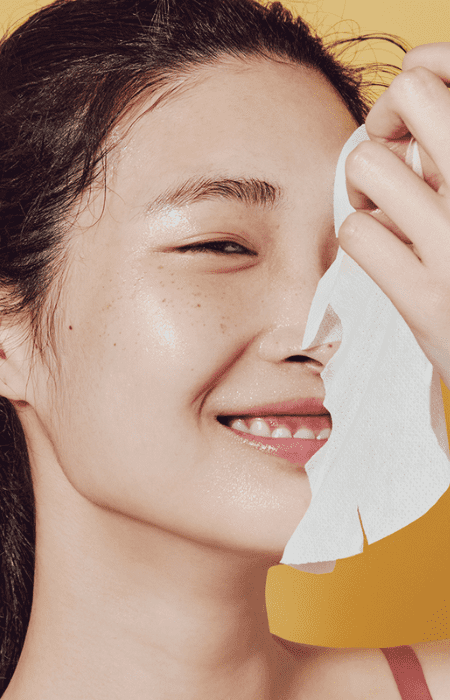
And if you’re not a fan of serums, face masks are here to save your day. These serum-soaked sheets restore radiance to your skin while also nourishing it.
On low-vibe days when you simply want to relax, grab your favorite face masks and take a power nap.
5. Eye Creams
These are absolute blessings. Under eye area is way more sensitive and delicate, so a moisturizer is simply not enough to protect the skin.
You can skip wearing eye cream if you don’t really see the need for it. But if your undereye area is growing excessively dark and puffy, this becomes an inevitable step.
Taking this into consideration, eye creams are specially formulated to treat dark circles, puffiness, worn-out skin, and other signs of aging.
Problem-Specific Skincare (With personal routines!)
As I’ve mentioned above, finding your definition of skincare is crucial.
Here are some common skin issues that might be the target of your treatment, along with the recommended ingredients to treat them.
A word of caution: Not all the below ingredients might suit or benefit you. Thus, always run a patch test and consult with a dermatologist to avoid allergies and irritation.
1. Aging
As all things change with time, so does our skin.
However, poor environmental conditions, severe pollution, and wrong skincare products can result in premature aging. That is, you’ve started getting wrinkles, dark circles, and sagging skin in your late 20s.
Some key ingredients to treat aging skin are:
- Ceramides
- Niacinamide
- Peptides
- Retinoids
- Sunscreen
- Vitamin C
2. Acne
As prevalent as air. UGH.
Acne is a skin condition in which dead skin cells and oil clog the skin pores/hair follicles, causing whiteheads, blackheads, and pimples.
While in some cases acne remains constant even after treatment, you can always reduce the discomfort through the following elements:
- Salicylic Acid
- Glycolic Acid
- Azelaic Acid
- Benzoyl Peroxide
- Lactic Acid
- Retinoids
- Niacinamide
3. Hyperpigmentation & dark spots
Be it injury scars or a change of tone in your skin. There are numerous reasons for hyperpigmentation and before jumping on to the skincare, you must first find out the cause.
Without finding why certain areas on your skin are darkening or changing color, it’s impossible to get the right treatment.
Below are a few ingredients that might help brighten your skin and even out the tone.
- Hydroquinone
- Alpha Arbutin
- Azelaic Acid
- Sunscreen
- Retinoids
- Vitamin C
- AHAs & BHAs (alpha hydroxy acids & beta hydroxy acids)
4. Sensitive Skin
You can’t treat sensitive skin, but using the right products will definitely prevent irritation. That is, you will be able to control acne breakouts and finally have that ever-glowing skin!
Before getting to the key ingredients, you’ve got to remember one thing — avoid fragrance chemicals at all costs! These allergens can easily trigger your sensitive skin, leading to dermatitis and other medical concerns.
Key Ingredients:
- Bakuchiol
- Hyaluronic Acid
- Squalane Oil
- Colloidal Oatmeal
- Ceramides
- Niacinamide
Things To Know Before Starting A Skincare Routine for Beginners
A few things to factor in before using new skincare products are as follows:
1. Pregnancy
Pregnancy hormones can shoot up melanin production, causing hyperpigmentation and other skin conditions. Moreover, numerous skincare ingredients could potentially harm the fetus and affect pregnancy, like retinol.
Therefore, it’s best to consult with your doctor first before starting/continuing your skincare routine.
2. Skin Of Color
Caring for skin of color can be a bit tricky since there’s an increased risk of hyperpigmentation as well as skin cancer.
My first advice would be to always wear sunscreen when going out. UV rays can do a lot more harm to your skin than you imagine, and thus it’s a non-negotiable precaution.
In case of hyperpigmentation, determine the cause first — shaving, wrong exfoliants or cosmetic products, chronic allergies, injuries, incisions, etc., to avail the right treatment.
3. Medical Conditions
It can be a daunting task to start a skincare routine when you’re continuously troubled with medical conditions like eczema and psoriasis.
Plus, allergies can also pose a hurdle when adapting to a new skincare regime if you’ve blindly chosen the products.
Thus, it’s best to consult your doctor or a dermatologist to understand your condition and what treatment you must seek. They’ll also brief you regarding a healthy diet, things or ingredients to avoid in meals as well as cosmetics, lifestyle changes, medicines (if needed), and so on.
Consistency Is Key, Hon!
Cannot stress this enough. Every skin is different, and so will be the result.
Maybe you’ll need to apply more than a “dime-sized” amount the influencers suggest, or maybe even half of it. While the influencer lands the glass skin in only 2 months, there are chances you’ll get that in six.
The thing is, you won’t know unless you give it a try and be patient. Run patch tests when trying a new product and experiment with proportions gradually if you feel like your skin needs it.
Apply the products in the right order without missing any step for the desired results. While skipping a day or two in a month won’t leave a huge impact, it’s better to stay consistent to treat your skin with love.
Bottom Line to the best skincare routine for beginners
Skincare starts with understanding your skin and not hoarding whatever the TikTok influencers suggest. So, find out your meaning of skincare before anything else.
Why do you want to build a skincare routine? Are you looking to treat a particular skin condition, need a certain result, or simply for the sake of self-love?
These basic questions will lead you to the right answers.
Next, determine your skin type — oily, dry, combination, or sensitive using the blotting method. Once you’re sure of this, only then proceed to adopting a skincare regime and expanding it slowly.
Do not forget to pay attention to any underlying medical condition and consult a dermatologist whenever in doubt. Be consistent and I’m sure your hard work is gonna pay off really, really well!
related articles to skincare routine for beginners
- The Only Skincare Routine For Dry, Acne-Prone Skin That Works
- 10 Step Korean Skincare Routine For Glowing, Flawless Skin!
- The Ordinary For Oily Skin: Most Magical Products + Skincare Routine
- The Best The Ordinary Skincare Routine For Acne
- How To Build The Ordinary Skincare Routine

